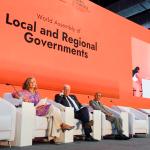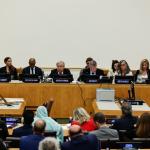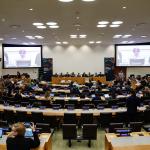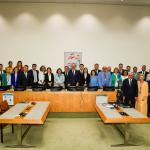
The Local and Regional Governments constituency gathered for the SDG Summit at the United Nations General Assembly (UNGA), as an official part of the intergovernmental process, to ensure localization and the role of local and regional governments in the achievement of the Sustainable Development Goals (SDGs) were front and center of the discussions.
This effort included the SDG Action Weekend of the SDG Summit with the holding of the Local and Regional Governments Forum. The Forum was the stage to present the statement of the Global Taskforce to the SDG Summit Political Declaration, together with the UCLG Decalogue of High-Impact Coalitions aimed at scaling-up action with global impact, the presentation of the seven years of the “Towards the Localization of the SDGs”, an unparalleled exercise of reporting on the state of Localization worldwide.
Also within the framework of UNGA78 High-level Week, our constituency had an active engagement at the UN Climate Ambition Summit, with high moment interventions by several Mayors representing the networks and the organized constituency, including at the opening plenary.
The delegation of local and regional governments throughout the week was composed of over 80 Mayors and Governors and 120 delegates, together with the presence of the political leadership of the Global Taskforce, including representation of UCLG, ICLEI, C40 cities, Regions4, ORU-Fogar, CLGF, and large delegations by CEMR, UCLG Africa, UCLG Mewa, FLACMA, Mercociudades, UCLG ASPAC and UCLG Eurasia.
The delegation of local and regional governments at large brought together, among others, the Mayor of Amman Youssef Alshawarbeh, Deputy Mayor of Astana Bekmurzayev Yerlan, Mayor of Avcilar Turan Hanerli, Mayor of Bacoor Strike B. Revilla, André Viola, President, Department of Aude, Mayor of Bishkek Kongantiev Kuvanychek, Mayor of Bilbao Juan María Aburto, Mayor of Bogotá Claudia López, Mayor of Buenos Aires Horacio Larreta,, Mayor of Cologne Andreas Wolter, Mayor of Jambi Syarif Fyashya, Lieutenant Governor of Ontario Elizabeth Dowdeswell, Mayor of Soria Carlos Martínez, mayor of Rabat Asmaa Rhlalou, Mayor of Dublin Daithí de Róiste, Mayor of Banjul Rohey Malick Lowe, Mayor of Lampedusa Filippo Mannino, Mayor of Kitchener Berry Vrbanovic, Mayor of Iztapalapa Clara Brugada, Mayor of Rio de Janeiro, Eduardo Paes, President of Nouakchott Fatimetou Abdel Malick, Governor of Sucre Héctor Espinosa, Mayor of Jonieh Juan Hobeiche, Mayor of Djibouti Said Daoud, Mayor of Villalba Luis Javier Hernández, Mayor of Utrecht Sharon Dijksma, Vice-President of Montpellier Clare Hart, and Deputy Mayor of Tallinn Tilt Terik. Moreover, for the United Nations Climate Ambition Summit, the delegation was joined by the Mayor of London, Sadiq Khan, who spoke at the opening plenary, the Mayor of Paris, Anne Hidalgo, the Mayor of Dhaka North, Atiqul Islam, among others.
With Localization consolidated as a crucial accelerator of the 2030 Agenda and featured in the SDG Summit political declaration, Member States continued to show increasing engagement with the Local and Regional Forum (LRGF) and other spaces of the constituency. Building up on the milestones preceding the SDG Summit, such as the World Assembly of Local and Regional Governments held in the context of the Second UN Habitat Assembly, in June 2023, and the UN High-Level Political Forum of July 2023, meetings which saw the presence of Member States at the ministerial level playing an active role in the discussion with our constituency, this LRGF counted on the presence of Jader Filho, Minister of Cities of Brazil, Ana Jiménez de la Hoz, Ambassador and Deputy Permanent Representative of Spain to the UN, and Marilou McPhedran, Senator of Canada, were a key part of the GTF events.
An SDG Summit with mixed emotions
The constituency at the official opening
The SDG Summit offered a space for local and regional governments in the formal session of the Summit at the UN General Assembly, as Mayor Cosse set the scene of the opening day of the Summit in a conversation with Mia Mottley, Prime Minister of Barbados and co-Chair of the Sustainable Development Goals Advocates group, and Ajay Banga, World Bank President. With the SDG Summit political declaration making strong emphasis on accelerated action for the SDGs through facilitating partnership with all actors towards the SDGs, ambitious social and climate action, and international financial system reform, the conversation was a relevant moment for our constituency, bringing together an elected local and regional government official with two of the most relevant actors dealing with the challenges and opportunities stemming from the Political Declaration, and ahead of the important meeting between the World Bank and the IMF in October 2023, which the UNSG is calling for not to be “business as usual”.
As a prelude, the discussion in the General Assembly evolved around the importance of addressing the six key SDG transitions — food, energy, digitalization, education, social protection and jobs, and biodiversity — with more efficient, affordable and enabling funding, easing the access to financing for the SDGs by aligning the mission of MDBs with the 2030 Agenda, accelerating global debt restructuring so it’s not an unbearable burden for LDC countries, and translating the commitments made in the political declaration into concrete policies on the ground. In this context, Mayor of Montevideo, Carolina Cosse, highlighted the need to work with local and regional governments as primary service providers and called for a cultural change grounded on care to tackle climate change and ensure development for all.
The SDG Summit Political Declaration
The final Political Declaration for the Summit was approved on the first day of the SDG Summit, with strong references to localization and the importance of sustainable urbanization and the urgent need of transforming the international finance architecture, as well as a clause that called for multilevel coordination to achieve the 2030 Agenda.
The statement that the Global Taskforce presented to the SDG Summit celebrated these mentions as key achievements, but signals that the Declaration is not as ambitious as it could be, and further calls on the international system to foster the potential of the New Urban Agenda, acknowledge SDG11 as the catalyst for the 2030 Agenda, and understand global common goods as resources and social practices that interconnect all spheres of action.
With the SDG Summit not fully reaching the ambition that our planet and communities need, the Statement calls for transformative, and urgent change at all levels and by all stakeholders is needed to overcome the crises and obstacles facing our world.
In this sense, the local and regional governments constituency welcome the comments by the UN Secretary General Antonio Guterres during the opening of the SDG Summit calling for spurring progress in the months ahead to rescue the SDGs and establishing a “development to-do list”, to lift the words of the Political Declaration off the page -words such as Localization- with policies, budgets and investments needed to achieve the SDGs.
Through the Statement and the different events held during the SDG Summit, the local and regional governments constituency stated its willingness to act to achieve the six SDG transitions, and look forward to being a part of the renewed global financial architecture, bringing recommendations to the Summit for the Future and the 2025 Financing for Development Conference. These milestones, together with the World Social Summit, are part of the same process towards a reinvigorated multilateral system in which all the global development agendas are localized and achieved as one.
Localization throughout the SDG Summit
The events held throughout the SDG Summit and the UN General Assembly aimed at a strengthening of the partnership between the municipal movement and UN bodies most linked with the implementation of the global goals. However, in spite of Localization’s protagonist presence throughout the Summit, the engagement of UN Agencies’ principals in Global Taskforce events was a step back from the support that local and regional governments received in the previous High-Level Political Forum, which reinforces the plight of local and regional governments for a structural space in the decision-making mechanisms of the UN.
The constituency’s advocacy efforts have been oriented towards building the case that local and regional governments are committed to achieving the 2030 Agenda and are indispensable political actors, with localization at the center of transformative action. They have done so through the presentation of a Decalogue of High-Impact coalitions, which called on mobilizing transformative partnerships that put care at the center to achieve the SDGs and showcase with concrete alliances the territorial contribution towards the Summit of the Future, and with the presentation of 7 years of monitoring the state of SDG Localization, a one-of-its-kind repository presented each year to the HLPF.
The High-Impact coalitions presented at the Summit had the aim of mobilizing political commitment to scale-up local action with global impact, and chief among them were the Global Taskforce of Local and Regional Governments, with the commitment of renewing multilateralism and including local and regional governments at all levels; the Global Alliance for Care, which aims at bringing care for the human rights of all people and the planet to the center of discussions; the Culture 2030 Goal Campaign, which is committed to supporting cultural rights and heritage; and the Malaga Global Coalition for Municipal Finance and the Global Commission for Urban SDG Finance, with the goal to create alliances to transform the financing of the SDGs, and ensure a transformational shift in our financial and economic systems
The presence of a diverse ecosystem of stakeholders at various of the events organized by the constituency, including the Major Group for Children and the Youth of the United Nations, the CSO Engagement Mechanism, and the Executive Director for the International Trade Centre Pamela Coke-Hamilton, built on our pledge to mobilize together for multilevel governance and multi-stakeholder action to accelerate the implementation of the SDGs.
Building on our calls in the previous HLPF, and the various political processes of the past years, they have claimed SDG 11 as an indispensable accelerator of all SDGs, called for the need to implement the New Urban Agenda as an accelerator for all SDGs, and addressed the need to transform the current multilateral system to ensure it is based on transformative city diplomacy.
Local and regional governments at the SDG Action Weekend
The Local and Regional Governments Forum
The GTF, together with UN DESA, UN-Habitat, UNDP and the Local 2030 Coalition, convened the Local and Regional Governments Forum (LRGF) at the United Nations Headquarters. The Forum, an official event of our constituency within the SDG Summit’s SDG Action Weekend, was the place to raise the voices of local and regional governments as well as to re-emphasize the importance of SDG 11 as a key enabler for achieving the 2030 Agenda; the need to strengthen local public services to address inequalities, promote innovation and foster sustainability; and the role of local and regional governments in the future of production and consumption. Over 30 mayors and governors, together with representatives of Member States, stakeholders, and UN agencies’ principals, gathered in New York for a day-long Local and Regional Governments Forum.
The LRGF was both a testament to the growth of the constituency at the UN, as well as a key moment to call for broader inclusion of all stakeholders in the global decision-making tables. Local and regional governments brought to the table the coalitions that they had embarked in to achieve the goals, and presented statements aligned with the SDG Transitions. The testimony of the Mayor of Lampedusa, who reported on the dramatic scenes of human suffering following the arrival of over 7,000 migrants in less than 24 hours to the island was particularly moving, as he called for the recognition of the role of local and regional in governing and protecting human mobility with human rights and assistance at the core, and urged the international community to end migrants criminalization and review the concepts of borders and citizenship through and inclusion and people-centered lens.
7 years towards the Localization of the SDGs.
The SDG Summit offered an opportunity for our constituency not only to celebrate localization, but to pursue a broader recognition of their role, and to call for a stronger place at the decision-making table. The constituency brought to the table the seven reports presented yearly to the HLPF since 2017, under the title “Towards the Localization of the SDGs”, the most thorough and comprehensive analysis available of the state of SDG localization worldwide: they showcase 3,452 bold actions of 1,339 LRGs and their associations from over 145 countries.
Each of the seven annual reports provides critical information to understand the extent to which the national institutional environments, particularly of the countries presenting Voluntary National Reviews (VNRs) in a given year, enable or hamper local action. In this regard, the reports analyze how the implementation of the SDGs is coordinated within a given country and how the VNR is produced, focusing on the extent to which LRGs partake or not in these implementation and reporting processes.
VLRs and VSRs at the center of monitoring and innovative policy making
The Forum also reflected on the importance of Voluntary Local and Voluntary Subnational Reviews in the acceleration of the implementation of the SDGs as reporting tools but also policy tools, and provided the constituency’s priorities and aspirations for the UN Summit of the Future in 2024 and the World Social Summit in 2025
In 2023, LRGs participated in the national SDG coordination mechanisms in only 35% of the countries that presented VNRs and in the preparation of only 39% of such VNRs. This represents a positive evolution with respect to the 2016-2022 period, where figures were 29% and 38%, respectively. However, this evolution is not taking place at the pace that would be necessary to accelerate action and achieve the SDGs. Also, there are stark regional differences: while progress is more pronounced in some regions, others are facing stagnation and even setbacks. The reports call for redoubling efforts to support local SDG monitoring and reporting processes.
The LRGF also allowed for showcasing some of the High-Impact Localization Policies led by local and regional governments that are accelerating the commitments made and localizing the 2030 Agenda, which serve as a blueprint to achieve the Sustainable Development Goals.
Local2030 Coalition: Pushing Key Transformations and Achieving the SDGs by 2030
Besides the Forum, and aligned with the SDG Summit’s call to close the gap in the implementation, the UN rallied all actors behind a set of high-impact initiatives aimed at mobilizing leadership and investment for the SDGs. As part of the SDG Summit’s Acceleration Day, a dedicated session to this end took place on 17 September, led by Local 2030 with the collaboration of UCLG, as member of the Steering Committee of Local2030 Coalition. The session was introduced by Executive Director of UN-Habitat Maimunah Mohd. Sharif, who called for the need to embrace a radical change in politics, economics, and society to achieve the goals.
Local and regional governments brought to the event initiatives such as the Care Blocks in Bogotá and the Bilbao Values Charter. Through their statements, local and regional governments placed care as the integral element to achieve the transformations needed to achieve the goals. Partners also presented high-impact initiatives led by local and regional governments, such as Kelly T. Clements, United Nations Deputy High Commissioner for Refugees, who praised the Call to Local Action for Migrants and Refugees. Steered by UCLG, the Mayors Migration Council, the UN Migration Agency and the UNHCR, the Call to Action supports, connects, and funds concrete actions that fulfill the goals of the Global Compacts for Migrants and Refugees and contribute to the 2030 Agenda.
Multilevel Governance and Multi-stakeholder action to accelerate the implementation of the SDGs
The GTF organized a side event during the Acceleration Day of the SDG Action Weekend, on Sunday 17, September, together with Poland and Zimbabwe as co-chairs of the Group of Friends of Sustainable Urbanization and the New Urban Agenda, as well as with UN-Habitat, the UN Population Fund (UNFPA), the Major Group for Children and Youth - Migration Youth and Children Platform, and the Huairou Commission.
During this side event, the local and regional government constituency presented their contributions to the High Impact Initiative on SDG Localization. UNFPA introduced their collaboration with the local and regional governments constituency to localize the International Conference on Population and Development (ICPD) Agenda; reinforcing possibilities for family planning, ending maternal death, and eliminating gender-based violence.
The side event brought to light the importance of enhancing multi stakeholder partnerships. The Pact for the Future that is being developed by the UN is linked to localization and feminism and, as such, the feminist municipal movement had a critical role in its achievement. Local and regional governments underlined the key importance of solidarity and diplomacy as essential to become resilient, and underscored proximity, universality, and equality as the driving values to implement the goals, driven by local and regional governments.
Other major events
Aligned with the growing momentum for urgent international finance reform and on the sidelines of the SDG Summit, the Urban 20, an official engagement group of the G20 co-convened by UCLG and C40, presented the joint statement of the U20 Climate Finance Working Group. The group, led by the cities of Buenos Aires and Rio de Janeiro with the support of partners such as FMDV, GCoM and CCFLA and the endorsement of this year’s Urban 20 Chair, the city of Ahmedabad, called on national leaders, development finance institutions and the private sector to work with cities to accelerate access to climate finance, presenting seven action-oriented recommendations.
Together with the LRG Forum, the side events and the official session of the SDG Summit, the constituency was also involved in the Women-led Cities: Bringing Gender Responsive Actions, Solutions and Partnerships from the Local Level to Scale" side event, the Midpoint Moment of Generation Equality, the SDG16+ event organized by International IDEA, Pathfinders, TAP Network and others on Peace and Strong Institutions, and the side event organized by IOM to presented their flagship report “Leveraging Migration to Achieve the SDGs”, which highlighted the importance of including cities and the urban dimension for an effective people-centered migration governance.
The SDG Summit and the UN General Assembly are taking place together with the High-Level Meetings on Universal Health Coverage; Pandemic Preparedness, Prevention and Response; and Tuberculosis. The constituency of local and regional governments has been engaged in the preparations and has brought a strong message around the importance of local involvement on health beyond healthcare to the summit.




